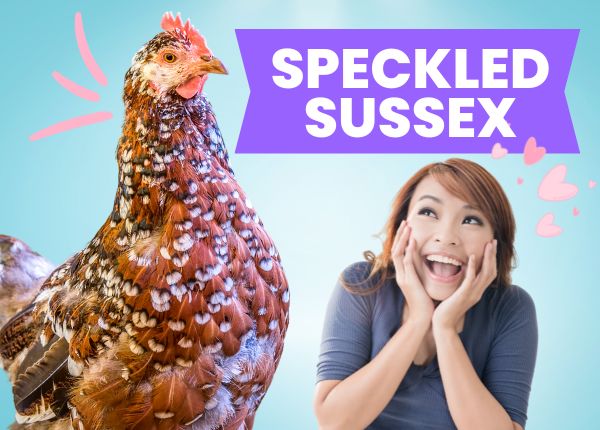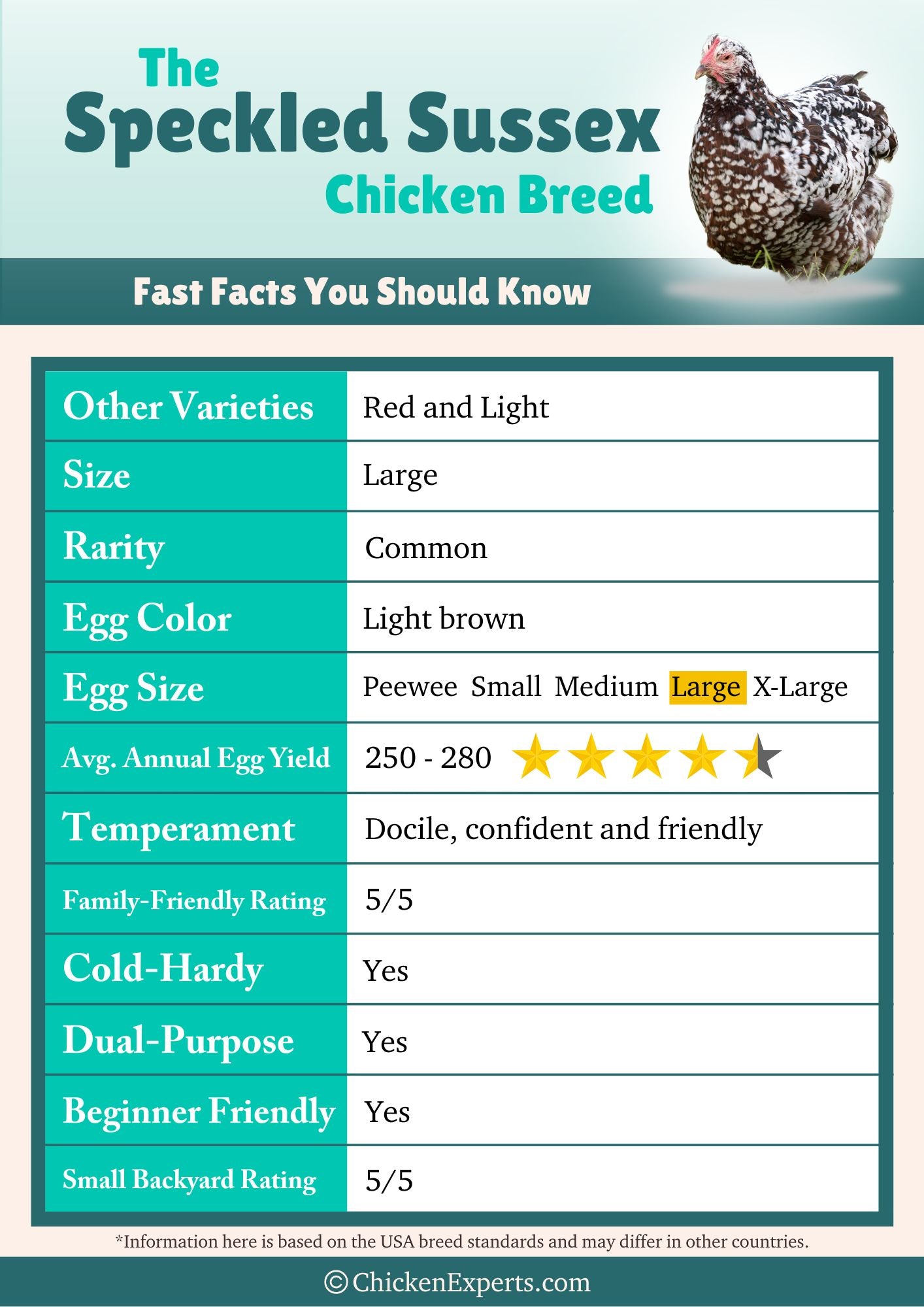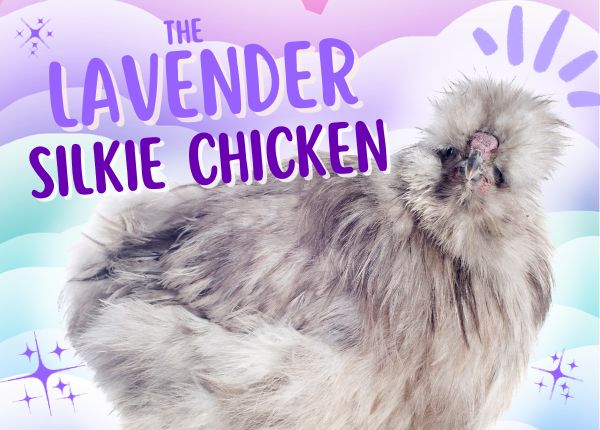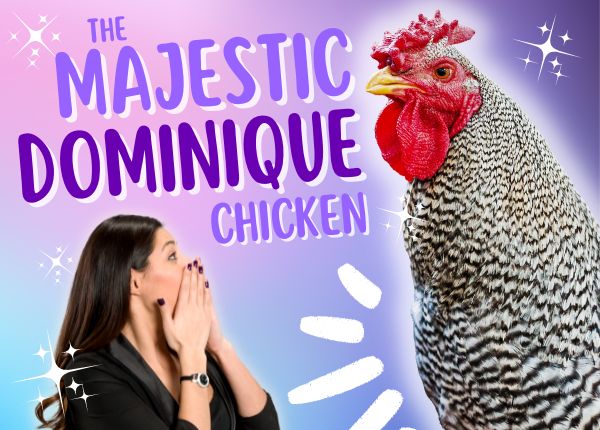
Some chickens just have it all. The Speckled Sussex has it all, with sprinkles on top! She’s got the personality, the produce, and the looks.
The Speckled Sussex is the perfect backyard chicken and what makes this gorgeous girl stand out in a crowded coop are those fabulous, freckly feathers. You just don’t get to see this top-to-tail polka-dot patterning with any other breed of chicken.
As well as those stunning, speckled feathers, Sussex chickens are also special because they’re one of the oldest chicken breeds on record. They’re as heritage as heritage gets!

The Speckled Sussex is the Benjamin Button of chickens. Like a fine wine, they get better with age, growing denser, more deeply patterned feathers after every molt.
This blog covers everything you need to know about this best-of-British bird: their size, appearance, eggs, temperament, needs, and the pros and cons of keeping Speckled Sussex chickens.
MEET THE SPECKLED SUSSEX CHICKEN

Why are Speckled Sussex Chickens So Popular?
Speckled Sussex chickens have earned their popularity by being such a brilliant and beautiful backyard breed.
Sussex chickens are favored for their gorgeous looks, friendly personalities, hardiness, and - of course - their plentiful, large eggs! There’s no compromise with this breed.
All varieties of Sussex chicken make perfect eggy pets, but the Speckled Sussex is the most popular pick, and I think the reason is kind of obvious. It’s because of those spangly, speckly, shimmery feathers.
Do Speckled Sussex Chickens Make Good Backyard Chickens?
Speckled Sussex chickens are a brilliant pick as backyard chickens. They tick all the birdy boxes when it comes to temperament, hardiness, produce, and sheer loveability. 🥰
Speckled Sussex chickens are also just beautiful to behold! Photos don’t do those iridescent feathers justice. You need to see one up close!
They’re cold hardy, happy, healthy hens, and they’ll lay eggs almost all year round for you. You can expect at least 180 eggs a year and more likely 200 – 250. That’s up to 5 eggs per week on average!
So, there’s good reason so many owners say they would happily keep this breed again!

Are Speckled Sussex Chickens Suitable for Beginners?
Speckled Sussex chickens are a very beginner-friendly chicken breed. I think they might be one of the best breeds on offer for families getting started with backyard chickens.
They’re healthy, hardy, and low maintenance. They’re also friendly, fun, and affectionate. They lay loads of lovely large eggs, and they just beg to be photographed and should have an Instagram account of their own. A bit much? Nope. I don't think that's egg-sessive at all. #ChickensOfInstagram #SpeckledSussex
Speckled Sussex chickens are resourceful and will happily supplement their diet with Mother Nature’s treats and nibbles. This means they stay active, make for great pest control managers in the yard, and they’re cheaper to feed. They don’t have any breed-specific needs.
Do Speckled Sussex Chickens Make Good Pets?
Speckled Sussex chickens are poultry-pet material, yes! They’re friendly and confident with people which makes them the perfect pets. They’ll happily peck their brekky out of the palm of your hand. They might even nuzzle up for a snuggle on your lap.
The Speckled Sussex temperament is calm, relaxed, curious, and attentive. Unlike some docile breeds, they don’t get their feathers ruffled too easily. They aren’t scatty or skittish so they’re easier to handle than some more anxious or flighty chicken breeds.
They’re resourceful chickens🐔 and will find their own food if you’re happy to let them roam free and forage. As with all good foraging chickens, they’re nosey little chicken nuggets and might get their beaks into places they’re not supposed to. You’ll need to pay attention to their boundaries and make sure doors are locked.
Nosey can be nice though, or as I prefer to say “chatty”. Your Sussex chickens will follow you around to see what you’re up to, and what you might have in your hands.
Are Speckled Sussex Chickens Good with Kids?
Speckled Sussex hens are a smart child-friendly chicken choice. They’re docile and calm, but they’re not easily startled or skittish. They can be handled easily and they’re not aggressive, especially if you get them from babies and hand raise them.
Their fun, nosey personalities make them a great starter breed for children who are new to chickens. They’ll woo the kids by tottering around after them, and their constant supply of eggs means the chore of checking the nesting box each morning rarely goes unrewarded.
Are Speckled Sussex Chicken Roosters Aggressive?
Speckled Sussex roosters are much the same as the hens. They will alert when needed, and they care for and protect their ladies dutifully, but they’re chilled out for roosters and won’t waste their energy starting a scrap unnecessarily.

SPECKLED SUSSEX CHICKEN EGGS
How Many Eggs🥚 Does a Speckled Sussex Chicken Lay?
A Speckled Sussex hen will lay 4-5 beautiful brown eggs each week. Their eggs are large and weigh around 60 – 65 grams.
You might egg-spect speckled eggs from a speckled hen, but Sussex hens lay light brown eggs.
They’ll lay all year round for you and tot up an impressive 180 and 250 eggs per year. They might take a short vacation during their molt, like all hens do, but other than that she’s all go!
We asked our Sussex-owner friends what they thought. Did 4-5 eggs a week sound right? 73% agreed that 4 eggs a week was the most likely count for this breed.

When Will a Speckled Sussex Chicken Start to Lay?
Speckled Sussex hens start laying eggs at eight months of age. This is a little later than other breeds, but once she pops…
Speckled Sussex hens will carry on laying at full throttle until they’re five years old. That’s at least 1000 eggs before she starts to slow down a little.
POLKA DOTS ARE BACK IN FASHION!
What Do Speckled Sussex Chickens Look Like?
As the name suggests, they’re speckled! Every feather has the most stunning deep mahogany base, a central black bar with iridescent green and blue tones, and a bright white tip.
Their coloring is stunning, but it’s functional too, as it camouflages them well when they’re scratching about for feed in all sorts of environments.
Speckled Sussex chickens are large birds and are stocky and broad to look at. They have short, muscly, featherless white legs, white feet with four toes, and white skin.
They have red wattles, a single red comb, and red ear lobes.

What Varieties of Sussex Chicken Are There?
There are dozens of recognized varieties of Sussex chickens, and lots of handsomely-colored hybrids too.
In America, it’s only the Red, Speckled, and Light varieties of Sussex chicken that are recognized under the American Poultry Association breed standards.

In 1914 the Red Sussex and the Speckled Sussex were both accepted into the APA breed standard and the Light Sussex was introduced later on in 1928.
In 1902 the Speckled Sussex was one of the first chicken breeds to be registered in the UK. Eight varieties of Sussex chicken are still recognized in the UK now, though some are sadly very rare.
Speckled Sussex
Stunning, speckled feathers from beak to bottom! The most popular color variety of Sussex chickens.

Light Sussex
A white feathered variety that has black neck and tail feathers.
"The development of the light variety was probably influenced by Oriental breeds such as the Brahma and Cochin, and also by the silver-grey Dorking.” (Wikipedia)
Coronation Sussex
Not to be confused with the curry-flavored sandwich filling you might be thinking of! The Coronation Sussex was created specifically for the Coronation of Edward VIII. A variant of the Light Sussex, but with light blue, or lavender, neck and tail feathers.
Red Sussex
A deep red color that’s almost like that of the Rhode Island Red. Very popular in the UK and the US still. It was originally black breasted but that’s been bred out of the line now.
“The red was originally black-breasted; it and the brown may have been influenced by Indian Game.” (Wikipedia)
Brown Sussex
The Brown Sussex sports a deeper coloring than the Red. Sussex. The feather pattern is partridge-like, and it’s become a very rare variety since the industrial revolution.
Buff Sussex
The Buff Sussex appeared on the chicken scene in the 1920s. The coloration is buff with black neck and tail feathers. They are also sadly very rare now.
White Sussex
Also appearing in the 1920s they are entirely white. Again, they're rare now.
Silver Sussex
This is the most recent variety of Sussex to be accepted. They’re black with silver penciling, especially in the breast area.
How Big are Speckled Sussex Chickens?
Speckled Sussex chickens are large birds. They’re not the largest - in fact - I’d say they’re perched on the fence somewhere between a medium and large!
Speckled Sussex hens weigh 6-7 lbs, and roosters🐓 weigh 8-9lbs.


Speckled Sussex Bantams
If you are looking for everything that the Sussex chicken has to offer, but just a bit - well - smaller, then you’ll be delighted to hear that Speckled Sussex bantams are available to buy. They’re also quiet, friendly, and are good layers, which makes them perfect for more suburban environments.
The bad news is that they are really hard to get your hands on. There are not many breeders who offer Speckled Sussex bantams, and as a result, they're prone to genetic issues. If you do manage to source some Sussex bantams, you might struggle to breed them.
How To Tell a Speckled Sussex Chicken Hen from a Rooster
Baby Speckled Sussex chicks don’t look a bit like their folks! As far as their feathers are concerned, they look more like feathery chipmunks than freckly hens. Boys and girls have the same down pattern, so Speckled Sussex chicks can’t be auto-sexed.

After a few weeks, the experts at the hatchery may be able to guess pullets from larger, heavier cockerels based on their size, and the color of their wattles and combs. They’re likely to be popping out eggs or crowing before you know for sure what you're dealing with.
ARE THEY REALLY FROM SUSSEX? WHAT'S THEIR STORY?
Yes! But it’s very reasonable to ask since chicken breed names tend to be deceptive, like the Indian game bird, which came from Cornwall.
What's the History of the Speckled Sussex Chicken?
The Sussex chicken was bred as a dual-purpose bird with the primary focus being on the quantity of its meat.
The Victorians first introduced these big-bottomed beauties as Kentish fowl at the first UK chicken show at London Zoo in 1845. They were actually from Sussex, not Kent, but it’s not far off, an hour's drive maybe).
Sussex (and neighboring Kent who clearly wanted in on the action) continued to breed these chunky chickens to sell in London for the meat market.
The Sussex was cross-bred with Brahmas, Dorkings, and Cochins to enhance their curves, and by the 1950s they were considered to be the best British fowl available for fine dining with their succulent white meat.
During World War 2 it was the Sussex and the Rhode Island Red chicken which were selected as Britain’s dependable, primary source of chicken meat and eggs.
Faster maturing broiler birds took over from the Sussex in the meat market as time went on, which resulted in their decline, but some still prefer a traditional, heritage Sussex.
Scratching back a little further into their history, it’s thought the original Sussex (or Kentish) chickens were discovered in England by the Romans during the Roman invasion of Britain (A.D.43).
The Romans documented their discovery with drawings of a spotty chicken in Southern England and taught the Brits how to farm them and better utilize them as food.
Are Speckled Sussex Chickens at Risk?
The American Livestock Breed Conservancy lists the Speckled Sussex as a recovering breed
All Sussex chickens were once at risk. It was their meat and not their feathers that had them at the top of the popularity stakes during WW2, and when commercial broilers (which matured earlier and grew larger) were introduced, the Sussex fell out of favor.
Cluckily, as backyard chickens are appreciated more as poultry pets with a portion of eggs on the side, rather than the family meat supply, this pretty, heritage breed has found its way back into our barnyards and gardens.
Some varieties didn’t recover as well as the Speckled Sussex, such as the Brown, Silver, and Buff Sussex variations. It’s no surprise that the prettiest girl was the first one we brought back from the brink.
Are Speckled Sussex Chickens Broody?
Speckled Sussex Hens make marvelous Mommas. They sit well, and they’re attentive to their chicks. If you do look to breed your beautiful girl, she’ll be on board with the plan.
CARING FOR SPECKLED SUSSEX CHICKENS
How Long Do Speckled Sussex Chickens Live For?
Speckled Sussex chickens will live for up to eight years. Their lifespan will depend on the individual and their bloodline, but the biggest factor in your chickens’ lifespan will be their care.
Your chickens’ environment, diet, and healthcare will impact your chickens’ quality and quantity of life. If you care for your freckly friend well then, they’ll be at your side for a long old time.
Are Speckled Sussex Chickens Prone to Illness?
Speckled Sussex chickens are tough birds, in terms of their health. Other than the usual chicken-related health issues like mites, pasty butt, and bumblefoot, they don’t have any breed-specific issues to worry about.
Pasty Butt and Bumblefoot?
What on Earth are these?🧐
Get to grips with common chicken health issues and learn how to spot the signs before it’s too late with Chickenpedia’s beginner-friendly Chicken Healthcare Course.
Are Speckled Sussex Chickens Noisy?
Speckled Sussex hens are not noisy birds. They’re friendly and will chatter away to you as they follow you around the yard telling you all about their day. They’ll sing a well-earned celebratory song when they lay an egg, but they’re not mouthy madams. They shouldn’t annoy the neighbors.
Are Speckled Sussex Chickens Cold Hardy?
The Speckled Sussex is well suited to a colder climate. They’re not too fussed by the cold and have dense feathering to keep them well insulated through those colder days and nights. They’ll happily wander out in freezing conditions, so just keep an eye on their tootsies to make sure they stay dry and don’t suffer from frostbite.
Are Speckled Sussex Chickens Suited to Warmer Climates?
Speckled Sussex chickens aren’t suited to hot climates. They will do fine at most moderate and cold temperatures, but they can’t handle extreme heat well.
Their dense feathers make it hard for them to chill their boots, so if you have an unexpectedly hot day make sure your Sussex has lots of shade and water. She won’t be popping her bikini on and sunbathing on the coop roof.
Can Speckled Sussex Chickens Fly?
Speckled Sussex chickens are too heavy to fly well. They can fly, don’t get me wrong, just not very high or very far. This isn’t a bad thing so long as you keep your chickens secure from predators and it means they’re easier to handle and contain without the need for a covered run or extra high fencing. Think these two blue to the can chicken fly article plz.
Wondering which chickens can and can’t fly? Find out here. It might just surprise you!
Do Speckled Sussex Chickens Mix Well with Other Breeds?
Speckled Sussex hens are sometimes a little too nice for their own good. They do end up at the bottom of the pecking order if they’re kept with more boisterous breeds.
If you pair them up with equally placid birds then you should be fine, but make introductions slowly, and make sure they have enough room to escape an attack since they won’t be flying out of harm’s way.
How Much Space Do Speckled Sussex Chickens Need?
Speckled Sussex chickens are quite big birds, so you can’t keep them comfortably in small, urban coops. The healthiest and happiest Sussex chickens will be allowed to free range or have a sizeable run that allows at least 12 square feet per chicken.
Each Speckled Sussex will need a 12 x 12-inch nesting box to accommodate her booty, but she will be content double-bunking with another hen. I wouldn’t have any more than two Sussexes per nest box though. Even if they seem happy to share, your eggs will be scrambled before you reach them.

What Should I Feed My Speckled Sussex Chickens?
Your Speckled Sussex’s dietary needs will change as they grow. They don’t have any breed-specific needs, and you can work your way through starter feeds, grower feeds and layer feeds as you would with any breed of chicken.
Those fab freckles are worthy of a little extra TLC, so I’d recommend investing in a molt-specific feed during their molt period to help them grow back a beautiful wardrobe every season.
What’s amazing about Speckled Sussex chickens is that they get frecklier with age!
After every molt, they grow back a denser, even more beautiful, camera-ready coat.
Protein is important for bigger birds, and whilst you could treat your Sussex to extra protein with snacks like mealworms, shellfish, meat, nuts, and seeds, they will find their own free-of-charge goodies if you let them! They’ll be very happy to spend their days topping up their tummies with bugs and seeds from the land.
Speckles Sussex Pros and Cons
Pros:
- Beautiful
- Hardy
- Reliable Layers
- Large Eggs
- Good Meat Birds
- Beginner friendly
- Kid-friendly
- Quiet
- Roosters aren’t aggressive
- Great Foragers
Cons:
- Cannot be auto sexed
- Don’t cope well in extreme heat
- Don’t always cope well if kept with more assertive breeds
Are Speckled Sussex Chickens Right For Me?
Unless you lack the space they need, live in a very warm climate, or keep more bossy chickens already, I can’t see why this breed wouldn’t be a huge hit for you! Their pros certainly outweigh their cons.
SHOW US YOUR SPECKLES!
We love seeing your chickens, and hearing about your breed experience.
Let’s have a moment of honesty. We all pick our pets based – at least somewhat – on their looks. Nobody can resist those cute little faces!
Clucks matter, sure, but chickens live for 5-10 years. You can’t spend a decade with a diva who doesn’t deliver on your egg-spectations!
Picking your pet chicken needs a little research, and dependable, down-to-Earth advice. A minute spent checking out Chickenpedia’s chicken care courses would be a minute very well spent! When you subscribe to one course, you get access to them all. You’ll be able to cover all the basics before you bring your new chickens back home.
If you have a question that isn’t covered in their courses, blogs, or forums, then the egg-spert team of chicken wizards are there when you need them for 1-2-1 advice!











Leave a comment (all fields required)